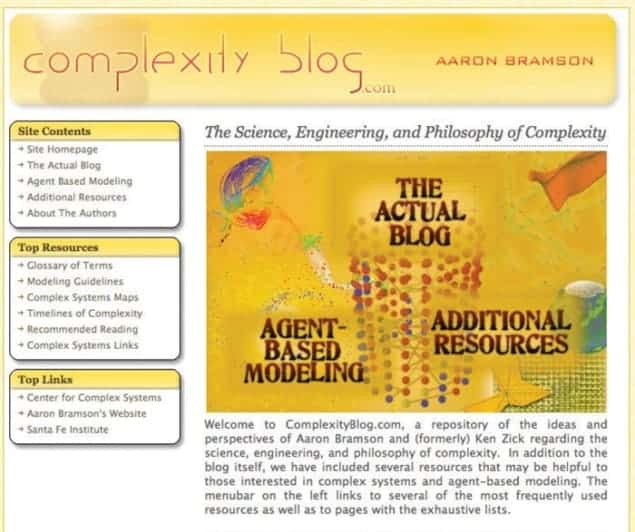ComplexityBlog.com – all you need to know about complexity science

URL: http://complexityblog.com
So what is the site about?
The site’s homepage calls it “a repository of ideas and perspectives regarding the science, engineering and philosophy of complexity”, and it pretty much does what it says on the tin. Part blog, part links archive, part library of modelling tips and tricks, the site is chock full of information that comes under the general heading of “complexity”.
What are some of the topics covered?
One of the joys – or problems, depending on your perspective – of complexity science is that almost anything worth thinking about can, potentially, fall under its aegis. The blog section of the site celebrates this trait. In between “serious” posts on topics like game theory, cosmology and the methodology of agent-based models, you can also find oddities like an evolutionary theory of dating and a map of the popular (and notoriously complex) TV series Lost. The non-blog portion of the site features a short-but-helpful glossary of complexity-related terms, a list of popular books on complexity, and a host of useful links to academic institutes and private companies involved in complexity research.
Who is behind it?
The site began as a joint effort by two University of Michigan PhD students, Aaron Bramson and Kenneth Zick, both of whom are interested in the science of complexity. Bramson’s academic background is in mathematics, economics and philosophy, and a lot of his posts focus on the social side of complexity theory. Zick, who left the project in late 2007, is a computer scientist and engineer with a keen interest in topics like game theory and evolutionary algorithms.
Why should I visit?
Because this is the nearest thing to a one-stop complexity shop available on the Web today. There have been other good sites in the past, notably The Complexity and Artificial Life Research Concept, but sadly, although www.calresco.org is still active, it suffers from an outdated site design and multiple broken links. Only time (and its authors’ future career paths) will determine whether ComplexityBlog.com meets a similar fate, but for the moment, there is plenty of up-to-date, fresh material here for experts and complexity neophytes alike.
Can you give me a sample quote?
Bramson, while discussing whether complexity science should have its own separate department within universities, notes that “Complex systems is still a young science; it suffers from conceptual immaturity and technical inability. It might appear to be a backwards argument to claim that we ought to establish a degree-granting institution so that individuals can work to make the discipline credible. But we must recognize that pursuing a clearer understanding of the underlying mechanisms of phenomena…will simultaneously enlarge [other] fields and ground complex systems. And by tying those mechanisms across disciplines, we all gain a better understanding of the individual applications.”



